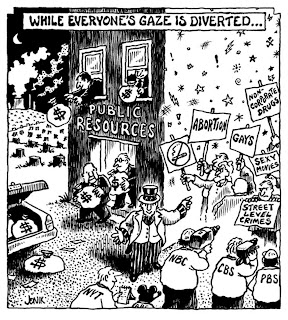American politicians, mostly united
Here's another cartoon by J. Jonik, with his permission:

Here's another cartoon by J. Jonik, with his permission:

At Salon, David Sirota noticed 15,000 journalists coming of nowhere to cover the Republican National Convention, which is not difficult journalism, but only a big fat staged PR orgy:
More and more media markets in America have become news deserts — places where city council meetings go uncovered, corruption scandals goes unnoticed and huge social ills go unmentioned. Typically, this is explained as a crisis of journalism — more specifically, a crisis of journalism resources. According to media executives’ talking points, news organizations are losing audience share, which means advertisers won’t pay as much for ads, which consequently reduces the revenues that fund real reporting. Rooted in a self-reinforcing cycle, this tautology seems to make perfect sense. The “Dickensian aspect” of real news that affects real people’s lives simply can’t be covered because news outlets just don’t have the resources! There’s just one minor problem with this fable: It can’t be true when the same allegedly cash-strapped media is deploying 15,000 journalists to the non-news events known as the Republican and Democratic conventions.
Mitt Romney says we can't afford to support PBS, National Endowment for the Arts or Amtrack. This is a disgraceful lie. These three programs add up to barely more than $2 Billion/year. Let's put that number in context. How much are we now spending on the militarization of America? $1.2 Trillion per year (carefully count the zeros and make sure you add it ALL up, like Tom Dispatch has done). That comes out to $600 Million per working HOUR (assuming that there are 2,000 working hours per year) to militarize the United States (don't call it "Department of Defense," because this is largely a lie). In other words, with FOUR HOURS of our warmongering budget, we could afford all of the things Romney says we need to cut. [More . . . ]
The American news media often fails, even in its self-appointed role as stenographer for powerful people. According to Glenn Greenwald, "many American media outlets, including the NYT, give veto power to the Obama campaign (and, less so, to the Romney campaign), as well as political offices generally, over the quotes of its officials that are allowed to be published. . . . I genuinely do not understand how any self-respecting journalist could even consider agreeing to this. But they do, so much so that it is now widespread custom. I don’t primarily blame the Obama campaign or other politicians for this: it’s natural that they would want to manipulate the American media as much as possible for their own interests and use every instrument, no matter how journalistically unethical, to achieve that. But its extreme use now is reflective of the general fixation which the Obama administration has on secrecy and controlling the flow of information . . ."
Robert McChesney and John Nichols have written an excellent book advocating substantial public support (much more than the government currently gives) to support first-rate journalism. The book is titled The Death and Life of American Journalism: the Media Revolution That Will Begin the World Again (2010). This book begins with a diagnosis of modern journalism. One of the main problems is that modern journalists rely far too much on officials in power to set the news agenda. In fact, when politicians aren't arguing about an issue, it tends to go completely under the media radar. Another problem is that much of our news is regurgitated press release material issued by powerful government and business officials. "The dirty secret of journalism is that a significant percentage of our new stories, in the 40-50% range, even at the most prestigious newspapers in the glory days of the 1970s, were based on press releases." In the 1980s, the national workforce of PR specialists was about equivalent to the number of journalists in newspapers, radio and television. As of 2008, there were four times as many PR specialists as journalists. (Page 49). [More . . . ]